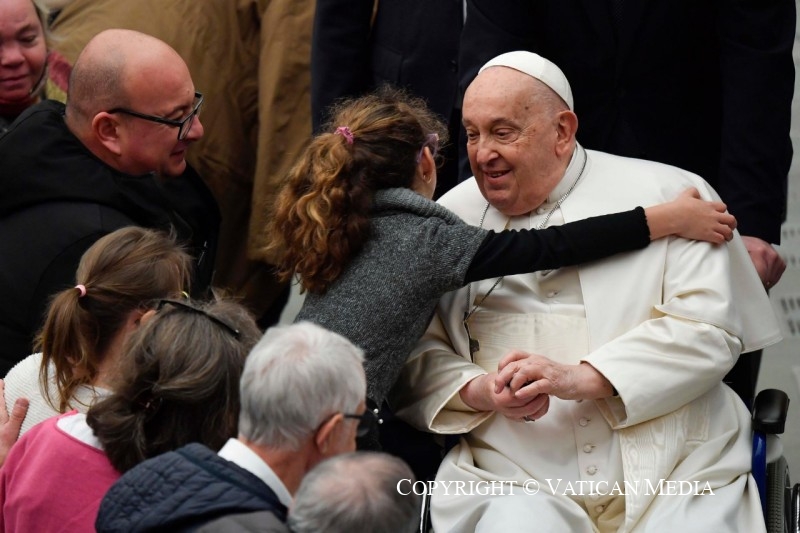Pope at audience: ‘Remember the displaced people of Palestine’
Francis, who appeared chilled in the Paul VI Hall, again turned his thoughts to the countries ‘suffering from war’, also mentioning Jordan. To the Polish pilgrims, he invited them to pray for consecrated people in poor and conflicted countries: for many people they are ‘proof that God always remembers them’. The catechesis - read by an official of the secretariat of state - on the Visitation: ‘The Magnificat: praise of faith, hope and joy’.
Vatican City (AsiaNews) - ‘We remember the displaced people of Palestine’. These are the faint words of Pope Francis, whohad a slight cold this morning at the Wednesday general audience, pronounced in the Paul VI Hall, in front of over 5,000 faithful.
His words come on teh heels of Trump's declaration last night during Netanyahu's visit to the United States, that Gaza that could become the ‘Riviera of the Middle East’, with the enclave's Palestinians transferred to Egypt and Jordan.
‘Let us think of the countries suffering war: the tormented Ukraine, Israel, Jordan,’ Bergoglio said addressing the Italian-speaking pilgrims. ‘Let us pray for them.’
Addressing Polish-speaking pilgrims instead - through the words of an official of the Secretariat of State - he shared the invitation to ‘pray for the priests and consecrated men and women who carry out their ministry in poor and war-torn countries, especially in Ukraine, the Middle East and the Democratic Republic of Congo’.
Stressing how much their ministry is for many people ‘proof that God always remembers them’, he said. At the end, the thought dedicated to young people, the sick, the elderly and newlyweds. To them the invitation to take up St Paul's exhortation: ‘I encourage you to be joyful in hope, strong in tribulation, persevering in prayer, solicitous for the needs of your brothers and sisters.
‘I want to apologise because with this severe cold it is difficult for me to speak and that is why I asked my brother to read the catechesis’. At the opening of the audience, after listening in different languages to the Gospel passage of reference - the episode of the Visitation narrated by the evangelist Luke (Lk 1:39-42) - the pontiff left the reading of the catechesis to Fr Pierluigi Giroli. The text is part of the cycle of Jubilee meditations entitled ‘Jesus Christ our Hope’; today the theme was ‘And blessed is she who believed’ (Lk 1:45). The Visitation and the Magnificat.
‘The Virgin Mary visits St Elizabeth; but it is above all Jesus, in his mother's womb, who visits his people’. This is how the pontiff summarises the episode of the Visitation, in which Mary ‘in haste’ sets out, without fear. ‘This young daughter of Israel does not choose to protect herself from the world, does not fear the dangers and judgments of others, but goes out to meet others,’ Giroli added.
It is the power of love that provokes a natural movement: ‘When we feel loved, we experience a force that puts love into circulation; as the Apostle Paul says “the love of Christ possesses us” (2Cor 5:14), it impels us, it moves us. It is the drive that Mary feels, as she helps her cousin and shares faith in the God ‘of the impossible and hope in the fulfilment of his promises’.
The encounter between the two women provokes a ‘surprising impact’. ‘The voice of the ‘full of grace’ who greets Elizabeth provokes prophecy in the child the elderly woman carries in her womb,’ Fr Giroli added.
‘Mary does not speak of herself but of God and raises a praise full of faith, hope and joy, a canticle that resounds every day in the Church during the prayer of Vespers: the Magnificat. It is a praise that comes from the heart of a ‘humble servant’, and represents a ‘memorial’. ‘It is interwoven with biblical resonances, a sign that Mary does not want to sing ‘out of the choir’ but to tune in to the fathers, exalting her compassion for the humble’.
The Magnificat is a ‘song of redemption’, which has as its background the liberation of Israel from Egypt. ‘The verbs are all in the past tense, impregnated with a memory of love that lights up the present with faith and illuminates the future with hope: Mary sings the grace of the past but is the woman of the present who carries the future in her womb,’ said Fr Pierluigi Giroli.
The first part praises ‘the action of God in Mary’. The second one delves into ‘the work of the Father in the macrocosm of the history of his children’. ‘Let us ask the Lord today for the grace to know how to wait for the fulfilment of all his promises; and to help us welcome Mary's presence in our lives,’ he concluded.
07/02/2019 17:28
11/08/2017 20:05







.png)










